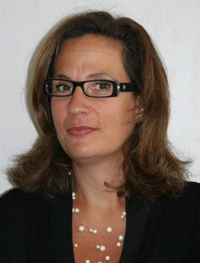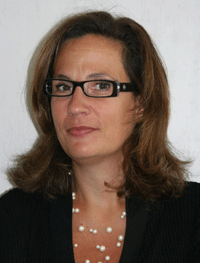"We should all join together and understand what is happening in a more efficient manner"
13 Sep, 2006 11:14 am
Ilaria Capua, is one of the authors of the Global Initiative on Sharing Avian Influenza Data launched in late August. She describes this initiative for Scitizen.
 Why this initiative?
Why this initiative? This initiative was born when the H5N1 virus reached Africa. As veterinary virologists we anticipated that this virus would spread very fast. It is the first time in history that such an infection reaches the African continent. Therefore it was our impression that more efforts had to be made on understanding the epidemiology, the mutations that this virus was accumulating and how it was moving. Today we still donít know if the virus has reached Africa throughout birds or through movements of infective commodities. Following the isolation of the first H5N1 in Africa, together with my team we decided to deposit the sequence in GenBank. This started an international debate [1] and leading veterinary virologists followed. There was a letter in Science published in the middle of June [2]. We were already working with some people of the medical side and some colleagues working in Bio-informatics. Thatís how GISAID crystallized.
The World Health Organization has already a system in which countries make samples and data available to affiliated labs. Is there a lack of data sharing?
The WHO has a system that was set up many years ago. This system allows a restricted number of laboratories to have access to the sequence data. GISAID instead makes the data available to a lot of scientists coming from different laboratories and also with different backgrounds, which I think is the greatest added value. The WHO database has some veterinary viruses but has mainly human viruses: there are thousands of animal strains that are sitting in freezers and thereís nobody looking at them. I believe that if avian influenza is to be considered one of the greatest threats for human health, which is what international organization say, then we should all join together and understand what is happening in a more efficient manner.
So what are the guidelines of this Initiative?
First of all, itís going to be free of charge and of unrestricted access. Itís going to be a virtual space hosting a database that will speak to the other databases - the European, the American and the Japanese. It might even be hosted by one of them. Hereís the whole idea: it is free of charge, you log in, you identify yourself, and then you agree to comply to the rules. The basic rules are going to be that you will acknowledge the intellectual property issues of those sequences that youíre looking at. You also agree to share yourself, if you have access to genetic data. Thatís more or less it in a nutshell.
We believe that more people will deposit in this system, for example people coming from developing countries that have interesting sequences. Their intellectual properties will be protected, so they should not be afraid anymore that their sequences can be exploited.
Precisely, some countries are often reluctant to share outbreak materials and data as it could compromise some national interests. How will you handle that?
This is a problem that we have had to face. But you are aware that thereís a lot of debate going on. For example in Asia, the Indonesians have decided to release their human sequences, thereís some talking going on in China. Certainly in other part of South East Asia and in Africa they understand that we have to move on with science. Itís not the case of hiding outbreaks any longer because it is not going to bring them anywhere.
We have to remember that avian influenza primarily a disease of animals that kills chickens, and chickens are the major protein source for a lot of people in developing countries. Therefore governments will understand, I think, the importance that we understand whatís happening. It is the first time that an avian influenza epidemic of this magnitude has ever occurred. The virus is encountering different hosts, and itís changing. We need to monitor these changes.
I believe that if we start showing that there is added value to sharing information, because we maximize the outcome of efforts coming from different parts of the world, then some countries will be less and less reluctant. I also believe that you canít achieve miracles in a short period of time! We will improve, we will find a way to get more and more information in real time. Sequences that are 2 years old are much less important than sequences that have been generated within the last month or so.
How many scientists have joined the initiative so far?
The signatories of the letter are 70 scientists from 40 countries of the world. Virtually all the affected countries have agreed, which is very important. Iíd like to point out that the countries that are not signatories itís not because they refused, itís simply because we had to get these signatures within a week and some countries are very difficult to reach. A website is being updated with countries that also agreed to be part of this initiative. This is extremely important that so many countries have agreed and that the medical virologists and the veterinary virologists are speaking to each other at the same level. In fact this initiative started off from the veterinary world. Veterinary virologists have been working on avian influenza for many years and they can be instrumental to controlling it but also to helping their medical colleagues to understand certain parts of the virus biology, of the pathogenic potential that maybe they cannot fully comprehend because they come from a different background.
Ilaria Capua, thank you.
[1] Science, vol 311, p. 1224 (3 March 2006)
[2] Science, vol 312, p. 1597 (16 June 2006)
-
19/01/10
H1N1 'false pandemic' biggest pharma-fraud of century?
-
05/09/07
The Most Conservative Protein of Flu Virus: Death Sentence or Life Saver?
-
28/03/07
Phylogeography Tracks Bird Flu?s Long March
-
28/12/06
Identification of Step in Flu Virus Replication Supports Development of New Vaccines
-
14/12/06
New Research Predicts Pathways Of Past And Future Spread Of H5N1 Avian Influenza







 Read more
Read more
Dr. Robert Kahn, Co-ordinator, Avian Flu Action
E-mail: rs_kahn@hotmail.com